
Featured Blog | This community-written post highlights the best of what the game industry has to offer. Read more like it on the Game Developer Blogs.
Squeaky Wheel's 2018 Year in Review
I reflect on Squeaky Wheel's 2018, opining on conventions, keeping up motivation, and how the Steam algorithm changes affected us.

Squeaky Wheel started life as a company in 2015, and with each year that passes, we seem to alternate between having a good year and a bad year. We started out 2016 with a publishing deal and the energy of a new company. 2017 was a tough year at the start since Political Animals had flopped, and we were on the verge of shutting down. The successful launch of Academia : School Simulator in late 2017 meant that we were riding high at the start of 2018. We were all set to continue that trend into 2019 until Steam decided to play with it's algorithm and wreak havok on our financial projections. But before we do a deep dive into that whole situation, let's go over what happened in 2018!
Maintaining Motivation in Early Access is Hard!
When we successfully launched Academia : School Simulator in 2017 the exhilaration was soon followed by a sobering realization. We had basically committed ourselves to working on this game for the next couple of years. Launching a game usually comes with the catharsis of no longer having to be consumed by that same game afterwards. But with Early Access you don't get that catharsis, you just kind of keep grinding on. If you don't have a set deadline, the idea of the finish line being endlessly out of reach can certainly be daunting.
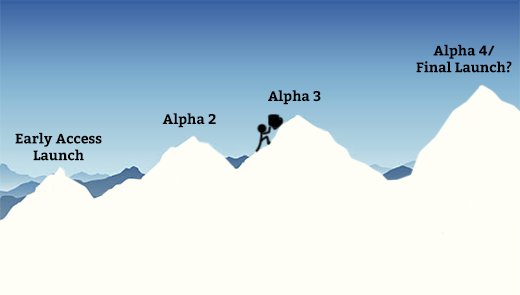
One solution to this is to break up development into Alpha Milestones, with each milestone having a set number of specific mechanics that must be finished before you can move on to the next milestone. This way you can a bit the “completion high” that a full game gives you, and you can organize some marketing around the launch of each milestone. We sort of half-assed our Alpha 2 because I pushed the team into doing it just a month or two before the actual launch, but we have a much better planned Alpha 3 being prepared for early 2019.
We Return to Conventions
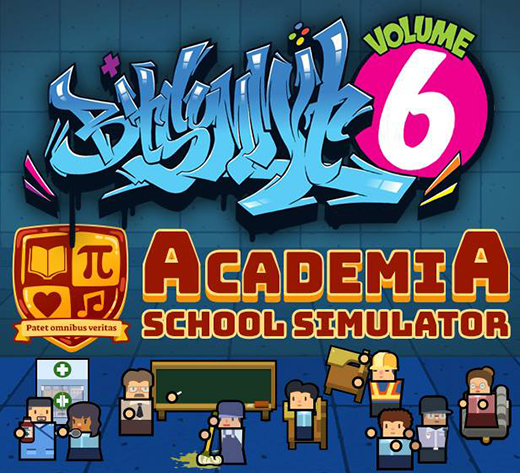
I was pretty down on conventions in 2016, seeing as how we saw very little success with them while promoting Political Animals, despite the keen interest we saw during the actual events. There's a gamasutra article detailing this issue with much more clarity, but the tl:dr is that people at game conventions are conditioned to be pretty hyped already by virtue of being at the convention, so all of the good vibes you're getting from their playthrough of the game may be legitimate, but is no way an indication of how good the game is or how well it will sell. This isn't to say all of the pre-launch marketing and convention hopping every developer does is pointless, it's just not worked out for us.
That said, conventions are good for other things, including : team building, morale boosting, developer networking (shoutout to all the cool developers we met and hung out with in 2018!), and exploring different markets. We achieved all of those things by going to conventions in Taiwan (Summer Game Show), Japan (Bitsummit and TGS), Korea (BICFest), and our “home” convention of ESGS in the Philippines. One of the cool things about being in Early Access is that you can combine marketing with key sales. We were able to subsidize a lot of our travel costs by selling Steam keys!
Random Thoughts about Different Conventions
TGS (Tokyo Game Show) is a terrible show for indies. The way the booths are arranged is super cramped, and the developers next to us ended up unintentionally crowding into our booth space. Most of the people and press going there are going for the big AAA games. Even with a free booth, I would not go back to TGS. Bitsummit in Kyoto is a much better show that is more focused towards indies. Even if the foot traffic is much smaller, it is also self selecting, and we got way more in terms of Steam key sales there. Kyoto is a much smaller city, and the atmosphere is such that the developers much more freely mingled with each other, whereas with TGS there was more obvious segmentation between different devs.
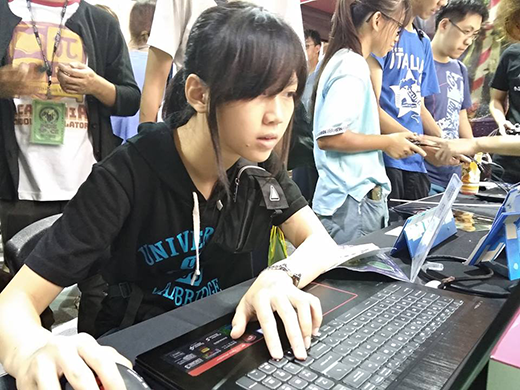
The Taipei (Summer) Game Show was a bit of a revelation. We mostly went because the booth was free (or so cheap it almost didn't matter). Taipei is less than two hours away from Manila and can cost less than $100 to fly to. We sold even more Steam keys than we did at Bitsummit, which was a bit of a shock to us. One of the organizers said that the attendees probably don't get a lot of PC games coming into town, so the novelty of having a game that was available on Steam showing its wares helped boost interest in us. Many of the people that bought a steam key had mentioned that they'd heard of the game before, and the fact that the venue was tiny (and packed) certainly helped get a lot of people in front of our booth. Interestingly, despite the success at selling keys, Taiwan doesn't rank very high in in terms of our Steam store earnings.
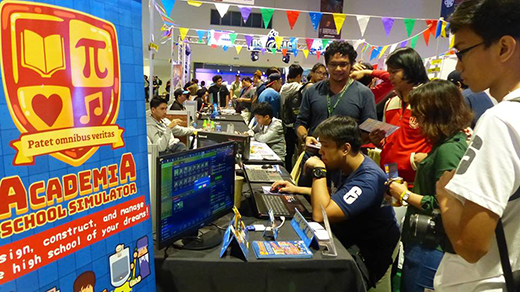
ESGS has become our go-to conference at home (the Philippines), and we always went into it with the lowest expectations based on our biases and understanding of local gamer culture (ie gaming driven by esports, mobile, console, and rampant piracy). We were pleasantly surprised at how many people bought Steam keys from us though, with at least one buyer refusing our discount and offering to pay full price. This leads me to be a little bit more hopeful about our local market, although as with Taiwan, the success at the convention didn't lead to any more revenue on the steam store itself.
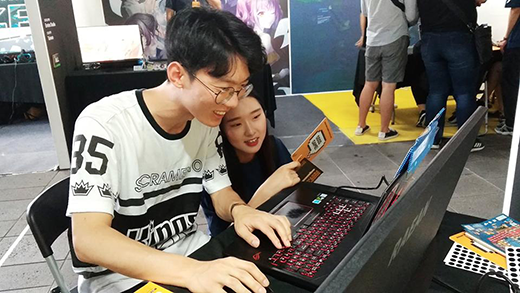
BICfest in Busan gets a special mention because like Bitsummit, the indie spirit and camaraderie is strong, and if your game gets approved they sponsor accomodation for 2 people!
Political Animals Gets Some More Recognition
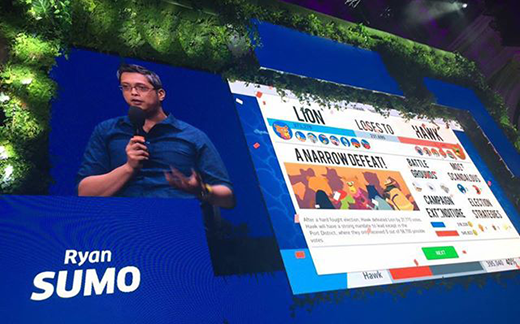
In May of this year I was invited to a great conference in Budapest called Brain Bar to talk about “Do games have (a) moral conscience”? While I hardly think anyone attending the conference was gonna go out and buy Political Animals after seeing this panel, it was still some nice validation for our first game.
We Had a Good First Three Quarters
Before I start talking about the bad news, I do want to take a moment to recognize how fortunate we were that for most of this year we were a profitable small indie studio. Jake Birkett of Grey Alien Games took a poll in November asking if “the last game you shipped cover its costs, including a nominal salary...” The results, while not surprising, showed the stark reality of how difficult it is to make money in this business.
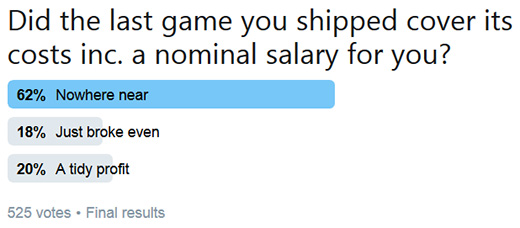
62% of people who put out a game lost money on that enterprise. Of those, I would be terrified to know just how many of them had quit their jobs, sacrificed their savings, or took out a loan on their property just to finance their dream. 18% of people just broke even, which means they got to tell their wife, partner, or family that they still had a roof over their heads, but that they might be looking for a regular paycheck from now on. Only 20% made a profit. Do you remember how your parents worried that you were getting into game development, and asked why you don't consider getting a “safer” job? To put it mildy, game development is a risky business (although to put it in context, probably no more risky than starting any other business).
For the first three quarters of 2018, we were making a tidy profit, and putting some of that profit into donating funds to schools as well as community building with local game developers. All of that changed in October.
Steam's Discovery Algorithm Killed Our Sales
The title above is a reference to a Jake Birkett blog (you should really follow his blog, as he does a very good job of taking the pulse of the indie game community at large) that he released earlier this month. If you're not familiar with what happened, here's a quick rundown. Steam's abrupt algorithm changes in October had a huge impact on Birkett's sales. After sharing the blog on Twitter, numerous developers across the Twitterverse (including ourselves) retweeted and shared Jake's sentiments, and press outlets like Kotaku picked up on the news. The coup de grace was Epic Games' announcement that it was opening the Epic Store with a much more generous revenue share.
I want to echo Jake by saying that without Steam and the access to the market it provides, we wouldn't be where we are now, part of the 20% of game developers that is (was?) earning a tidy profit. But that dependency reveals a major flaw in our business. We ultimately have no idea what goes on in Steam's algorithm. This is done to keep devs from gaming the system, but also means we have no idea what to do to improve our chances of the algorithm sharing our game with Steam's userbase. And these changes can have a huge impact.
For us specifically, the first month of changes saw our revenue drop to around 40% lower compared to our weakest month so far, and the second month saw our sales revenue drop to around 65% lower than our weakest sales month. To put that in other terms, after Steam takes its revenue and after taxes, we are now below the break even point on a month to month basis. As mentioned before we were fortunate enough that we were making a profit before and have been putting away money for just such an occasion, so we're not in any real trouble yet. But it is rather sobering to know that your expected revenues can be so drastically altered with a few keystrokes.
Moving to Different Marketplaces
Steam's access to their market has meant that there has been less of a focus for us on being in different marketplaces. Indeed, if we could make enough to profit by simply being on Steam, it simplified a lot of things for us. We could focus on a single marketplace to reply to our players, and focus our efforts into integrating further with Steam, by adding achievements, and in the future, leaderboards. Our past experience with Political Animals shows that at best, even Steam's largest competitor GOG only ever made up 10% of our revenue. So focusing on where most of the revenue game made a lot of sense. It's become clear that we can no longer keep doing that, and we need to adapt to the changing times (hopefully Steam does as well).
We already have a buy page on our website, with a humble widget included (hey indie devs, the humble widget takes only 5% of your revenue!). The Epic Store is intriguing and we'll send in an application for sure, but as far as I've heard, they're processing thousands of applications and won't be considering anything new until late 2019 (For anyone complaining about Steam opening the floodgates, this was the alternative all those years ago). Kartridge is interesting, but I've heard confidentially from a successful indie dev that their game, which has sold tens of thousands of units on Steam, only sold 4 on Kartridge in a year. Discord is definitely intriguing, especially with its streamer integration, but I worry about our capacity to regularly interact with players on a regular basis. We're naturally introverts and have our hands full just responding to forum posts, so I worry about how taxing that will be for us. Plus we have no idea how difficult deployment will be to their site.
So finally that leaves us with itch. Itch.io has long been the go-to place for weird, niche indie games, and never had pretensions to be a site for the mass market. It's still growing though, and most importantly for us it seems relatively pain-free to add it to our deployment process. So we'll be looking to add Academia : School Simulator to itch sometime next year. I don't expect we'll make a lot of revenue, my initial estimate is maybe 5% or less than total Steam revenue, but I'll report back with real numbers in the future.
What's Happening in 2019?
2018 was a pretty good year for us. I think it would be fair to say we perhaps got a little complacent, or if I'm being more generous, we allowed ourselves to enjoy the fruits of our hard work a little bit. I expect that 2019 will look a little bit more like our 2017, where we put our noses to the grindstone and try to work on getting as much of Academia : School Simulator done as we can, while simultaneously thinking about what we're gonna be doing next.
As usual, I want to thank the team for putting their all into the game, everyone who has supported us thus far, and all the players for buying the game and giving us great feedback over the past year. See you all in 2019!
Read more about:
Featured BlogsAbout the Author(s)
You May Also Like









